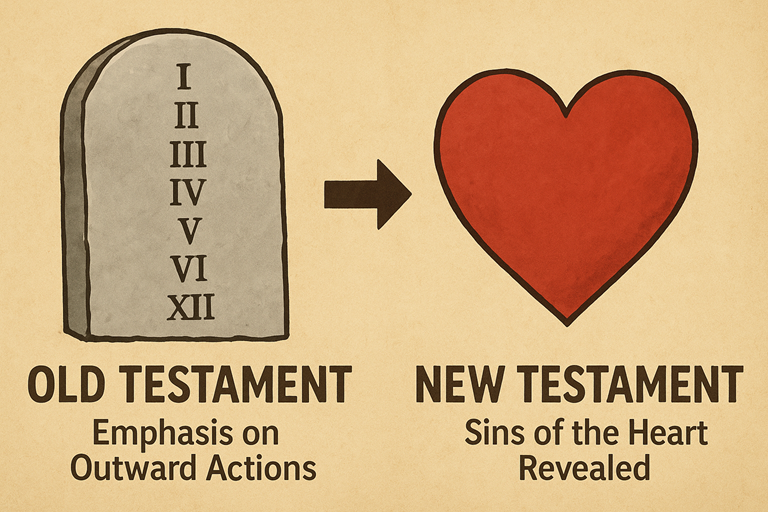Old Testament Morality: Emphasis on Outward Actions
In the Old Testament, morality is often defined by clear, outward actions. The Ten Commandments are a prime example – they forbid visible deeds like murder, adultery, theft, and lying (Exodus 20) . Ancient Israel’s law code was largely concerned with maintaining societal order and covenant faithfulness through behavior. If you didn’t steal, kill, or commit adultery, you were generally considered upright. The focus was on what people did or did not do. Even Israel’s wisest teachings often highlighted concrete actions: for instance, the Book of Proverbs warns against committing adultery or stealing food, which are observable acts. Sin was typically understood in terms of overt transgressions – the kind of wrongdoing that could be seen, judged, and punished by the community.
Yet, even in the Old Testament, there are hints that God’s concern went deeper than externals. The tenth commandment, “You shall not covet,” prohibits an attitude of the heart – an invisible desire for what belongs to another (Exodus 20:17). And the wisdom literature occasionally pulls back the curtain on inward life. Proverbs advises, “Above all else, guard your heart, for everything you do flows from it” . This suggests that even under the Old Covenant, the heart – the inner source of thoughts and motives – was recognized as crucial. Still, the predominant moral emphasis in the Old Testament remained on outward conduct. The sacrificial system and legal penalties addressed actions such as theft or adultery, not mere thoughts. In ancient Israel’s context, the law on “stone tablets” defined righteousness largely in black-and-white terms of behavior.
Jesus’ Radical Teaching: Sins of the Heart Revealed
When we turn to the New Testament, and especially to the teachings of Jesus, we find a profound shift. Jesus intensified the moral demands of the law by turning the spotlight inward – toward our thoughts, intentions, and emotions. In the Sermon on the Mount (Matthew 5–7), He famously declared that harboring anger is morally akin to murder, and indulging lustful looks is equivalent to adultery in God’s eyes . “You have heard that it was said… ‘You shall not murder,’ … But I say to you that everyone who is angry with his brother will be liable to judgment” (Matthew 5:21–22) . Likewise, “You have heard that it was said, ‘You shall not commit adultery.’ But I say to you that everyone who looks at a woman with lustful intent has already committed adultery with her in his heart” (Matthew 5:27–28) .
Jesus was not negating the old commandments; rather, He was fulfilling and deepening them . He revealed that God’s true standard goes beyond external obedience to the very root of sin in the heart. Under this teaching, the moral bar is raised: refraining from murder is not enough – one must also root out hatred and contempt. Avoiding the physical act of adultery is insufficient – one must also battle lustful desire. In Jesus’ view, the inward disposition is as much a part of one’s moral life as the outward deed. He unmasked pride, envy, and malice as defiling sins long before they erupt into actions.
This inward focus was revolutionary. Jesus chastised the religious leaders for their hypocrisy in maintaining outward appearances while nurturing corrupt hearts. He compared them to “whitewashed tombs” – pristine outside but full of death within – to illustrate that God cares deeply about inner purity (Matthew 23:27–28). At every turn, Christ emphasized authenticity and integrity of the heart. He taught that “nothing outside a person can defile them; rather, it is what comes from within” that defiles . As Mark’s Gospel explains, “From within, out of the heart of man, come evil thoughts, sexual immorality, theft, murder, adultery, … envy, slander, pride, foolishness” . All the classic sins forbidden in the Ten Commandments – and many others – originate in the heart . Jesus thus diagnosed the human heart as the real battleground of morality. His message: God’s concern is not merely that we avoid evil actions, but that we become the kind of people who don’t even want to do those actions because our hearts are being transformed.
Inward Sins: Equally Serious in the New Testament
The New Testament writers continued this emphasis, treating inward sins as equally serious as outward acts. The Apostle John bluntly writes, “Everyone who hates his brother is a murderer” . Hatred is an invisible attitude, but John echoes Jesus in declaring it tantamount to murder in God’s sight. Likewise, pride – a sin of the heart – is condemned throughout Scripture with intense language. “God opposes the proud but shows favor to the humble,” the New Testament warns (James 4:6) . In fact, pride often tops the list of vices that God detests. Proverbs lists “haughty eyes” (a proud look) even before “hands that shed innocent blood” in the catalog of abominations . The implication is clear: pride, envy, bitterness, greed – these inner conditions are not minor flaws but serious sins. They break the moral law just as surely as theft or adultery do, and often they are the very seeds from which those outward sins grow.
The Apostle Paul’s writings reinforce this. Paul’s letters to young churches include stern warnings against sins like jealousy, envy, anger, conceit, and malice, often right alongside forbidding sexual immorality or violence. For example, he admonishes believers to “get rid of all bitterness, rage and anger, brawling and slander, along with every form of malice” (Ephesians 4:31) . In Paul’s view, a fit of rage or a heart full of malice is utterly incompatible with holy living – these are not “lesser” sins just because they don’t always manifest in a visible crime. Elsewhere, Paul lists “enmity, strife, jealousy, fits of anger” in the same breath as drunkenness and orgies as “works of the flesh” that can bar one from the kingdom of God (Galatians 5:19–21). The message is unmistakable: inward sins can be spiritually lethal. A person might avoid outward scandal yet grieve God by a corrupt inner life of pride, resentment or greed. In fact, the New Testament suggests that outward righteousness without inward purity is hollow. Paul famously wrote that even if he made the greatest charitable sacrifices and pious acts, “but do not have love, I gain nothing” (1 Corinthians 13:3) . In other words, a lack of the right inward attitude (love) nullifies the moral value of even impressive outward deeds. Good actions, in Christian ethics, are meant to flow from a transformed heart – and without that, they ring empty.
The Overlooked War Within: Modern Christians and “Respectable” Sins
Despite this clear biblical witness, many Christians today – perhaps all of us at times – underestimate the seriousness of inward sins. It’s comfortable to measure our morality by visible benchmarks: Have I avoided lying, cheating, sexual immorality, criminal acts? By those measures, we might feel we’re doing “pretty well.” It is unsettling, however, to examine the heart. Churches may strongly denounce sins like adultery or theft (and rightly so), yet turn a blind eye to gossip, vanity, or bitterness in the pews. A Christian might never physically harm anyone, yet harbor grudges or bigotry in their mind. We often label pride, envy, anxiety, or impatience as “personality issues” or minor flaws, when Scripture calls them out as sins to be crucified. This discrepancy allows a culture of “respectable sins” to fester – attitudes that go unchallenged because they don’t cause public scandal.
Consider pride: it may not land someone in jail or on church discipline, but it is the very attitude that “separates us from God” . Envy and jealousy often hide behind polite smiles even as they rot away our love for others. Anger can be quietly nursed in the heart while one’s outward behavior still looks calm and composed. Jesus and the apostles would remind us that these invisible battles are of utmost importance. If anger equals murder in God’s court, then nursing a hateful grudge is spiritually toxic. If lust is adultery of the heart, then a secret pornography habit or fantasized infidelity is not a “lesser” sin just because it hasn’t led to a physical act – it’s urgently serious. The New Testament pulls no punches: “Anyone who hates a brother or sister is a murderer, and you know that no murderer has eternal life residing in him” (1 John 3:15) . That should jolt us into re-examining how lightly we may treat our internal failures.
Why do many of us overlook these deeper issues? One reason is visibility. Outward sins create immediate damage we can see – broken families, stolen property, violence. Inward sins often damage us slowly and silently. A burst of pride might not wreck a friendship in one go, but over time it erodes our capacity to love and empathize. Envy might not be obvious to others, but it sours our joy and can eventually lead to outward conflict. Another reason is social acceptability: in many Christian circles, respectability is maintained as long as one’s external life is in order. We quietly excuse a leader’s arrogance because “he’s gifted,” or we tolerate a longtime member’s bitterness because “that’s just how she is.” But God is not fooled. “The Lord does not see as man sees; man looks at the outward appearance, but the Lord looks at the heart” – this truth (first spoken in 1 Samuel 16:7) still indicts our superficial assessments. We may impress others by our lack of obvious sins, yet before God the hidden “thoughts and attitudes of the heart” are laid bare (Hebrews 4:12).
Toward Heart-Deep Holiness: Personal Implications
Recognizing this biblical shift toward inward morality has profound implications for personal holiness and ethical self-awareness. First, it calls for humility and repentance on a deeper level. It is no longer enough to say, “I haven’t broken any commandments today,” and then pat ourselves on the back. We must ask harder questions: Did I harbor pride in my accomplishments? Did I secretly rejoice at someone else’s failure (envy)? Am I nursing anger or unforgiveness? Honest self-examination in light of Scripture will lead us to repent not only of what we’ve done, but of what we’ve thought and felt contrary to God’s love. Jesus invites us to a righteousness that “exceeds that of the Pharisees” (Matthew 5:20) – one that cleans the inside of the cup and not just the outside (Matthew 23:25-26). This means pursuing purity of heart, not just propriety of behavior.
Second, this inward focus drives us to depend on God’s grace more deeply. External conformity can sometimes be achieved by willpower or social pressure, but transforming the heart is a different matter. We cannot simply scrub away pride or lust by ourselves. Thus, the New Testament emphasis on inner holiness goes hand-in-hand with the promise of the Holy Spirit’s work within us. God promised in the New Covenant to “write [His] law on their hearts” (Jeremiah 31:33) and to give us a “new heart” and “new spirit” (Ezekiel 36:26) that empower true obedience from within . Christians today must actively seek the Spirit’s aid in sanctifying their thoughts and attitudes. Prayer, confession, and accountability become crucial tools in the fight against invisible sins. We learn to echo King David’s cry, “Create in me a clean heart, O God” (Psalm 51:10), knowing that only God can fully purify our motives.
Finally, a heightened awareness of inward sin cultivates ethical self-awareness and empathy. We become slower to judge others harshly, knowing that our own hearts are battlefields of sin. This awareness breeds compassion – the kind Jesus showed to outward “sinners” even as He rebuked the hidden sins of the pious. It also fosters integrity: the same person we appear to be in public, we strive to be in private thoughts. When Christians take seriously Jesus’ call to be “pure in heart” (Matthew 5:8), our faith communities become more authentic. We shift focus from merely managing behavior to encouraging true spiritual growth. We start addressing gossip, arrogance, or resentment within our fellowship with the same seriousness that we address more visible moral failures, creating a culture that values heart-deep holiness.
Conclusion: The High Call of Inward Holiness
The contrast between the Testaments is not a contradiction but a progression. The Old Testament provided a foundation – clear boundaries for godly conduct – but the New Testament shines a light into the corners of the human heart. Jesus did not abolish the moral law; He fulfilled it and amplified it to its fullest intent, showing that every commandment was ultimately aiming at love and purity within. “You therefore must be perfect, as your heavenly Father is perfect,” Jesus taught, driving home the lofty goal of not just ethical actions but ethical character (Matthew 5:48) . For Christians, this means the work of morality is as much internal as external.
The challenge for us today is to not lose one emphasis in favor of the other. We need the moral clarity of “thou shalt not” – God still forbids murder, adultery, theft, and the like. But we equally need the piercing insight that harboring hatred, lust, pride, or envy is sin in the same category. Recognizing this truth should lead us away from self-satisfaction and into humble vigilance. It drives us to Christ, who forgives our hidden faults and sends His Spirit to renovate us from the inside out. An outwardly ethical life, by itself, is not the final goal; God desires “truth in the inward being” (Psalm 51:6). For a thoughtful Christian seeking to please God, the call is clear: do not merely avoid the gross sins the world can see, but dig deeper. Uproot the anger, prejudice, vanity, and covetousness within. Cultivate the virtues of Christ – humility, kindness, purity, contentment – in the secret place of your heart. In doing so, we honor the full biblical vision of holiness: a life where outward acts and inward attitudes align in righteousness and love . This is the high but rewarding road of true Christian morality – one that leads not to pride in our good behavior, but to a deeper communion with God, who transforms us from the inside out.
Sources:
- Holy Bible, Exodus 20:13–17 – The Ten Commandments on outward sins (murder, adultery, theft, false witness, coveting)
- Matthew 5:21–28 – Jesus equates anger with murder and lust with adultery, highlighting inward sin
- Mark 7:20–23 – Jesus teaches that evil actions come from within the heart (pride, envy, etc., alongside theft and murder)
- 1 John 3:15 – Hatred in the heart equated with murder
- Proverbs 4:23 – “Guard your heart, for everything you do flows from it” (the importance of inner life)
- Proverbs 6:16–19 – Pride (“haughty eyes”) listed among sins God hates, along with murder and lies
- Ephesians 4:31 – Paul’s instruction to put away inner sins like bitterness, rage, and malice
- James 4:6 – “God opposes the proud but gives grace to the humble,” showing God’s view of pride
- 1 Corinthians 13:3 – Without love (an inward virtue), the greatest sacrifices profit nothing
- Mathis, David. “Lord of All the Law: How Jesus Handled the Ten Commandments.” Desiring God, 2024 – Discusses Jesus’ fulfillment of the law and focus on heart-level righteousness
- Heerema, Matt. “Exodus 19–20: The Ten Commandments.” Stonebrook Community Church, 2022 – Notes that the Ten Commandments were always aimed at the heart, as Jesus clarified
- GotQuestions.org. “Why do you need to guard your heart above all else (Proverbs 4:23)?” – Emphasizes how our heart attitudes determine our actions













